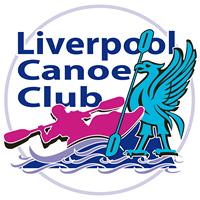Guidelines on Grading of a Club Trip
Guidelines on coordinating or running a club trip
Our “Home Waters” are Liverpool South Docks and most of our basic coaching and leading takes place from our compound in Coburg Dock. Leaders and coaches undergo a basic training and familarisation course before being able to run sessions there. This includes local knowledge, proceedures, access points and general guidance advice on running a club session.
When describing trips we use the international river grading system or Sea grading system used in many guidebooks. However, these grades can change greatly with weather conditions. Please take account of high water levels or gusty or changing weather systems. Club trips are usually sheltered or moderate water grades 1-3 / A-B but occasionally with very experienced leaders include grade 4 / C. (Grades 5 and 6 (C+) are only included here for reference).
Leaders should consult the latest guidance on grading and conditions from BCA…….
River Grading System
Sheltered Slow moving Water (Novice Paddlers)
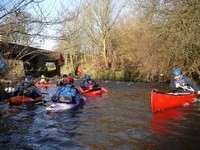
Open to novice or less expericed paddlers with suitable equipment. Ungraded sections of slow moving rivers where the group could paddle upstream against the flow (not involving the shooting of, or playing on, weirs or running rapids). Eg Lower River Dee from Farndon.
Easy Moderate Water Grade 1 & 2 (Improver paddlers)

Waves, small stoppers and other minor obstructions to avoid. Small rapids featuring regular waves. Some manoeuvring required. Eddies and cushion waves may be strong. Eg The River Rothey (Lake District) or River Dee – Corwen to Horseshoe Falls … Grade 1-2
Moderate Water Grade 2(3) (Intermediate paddlers)
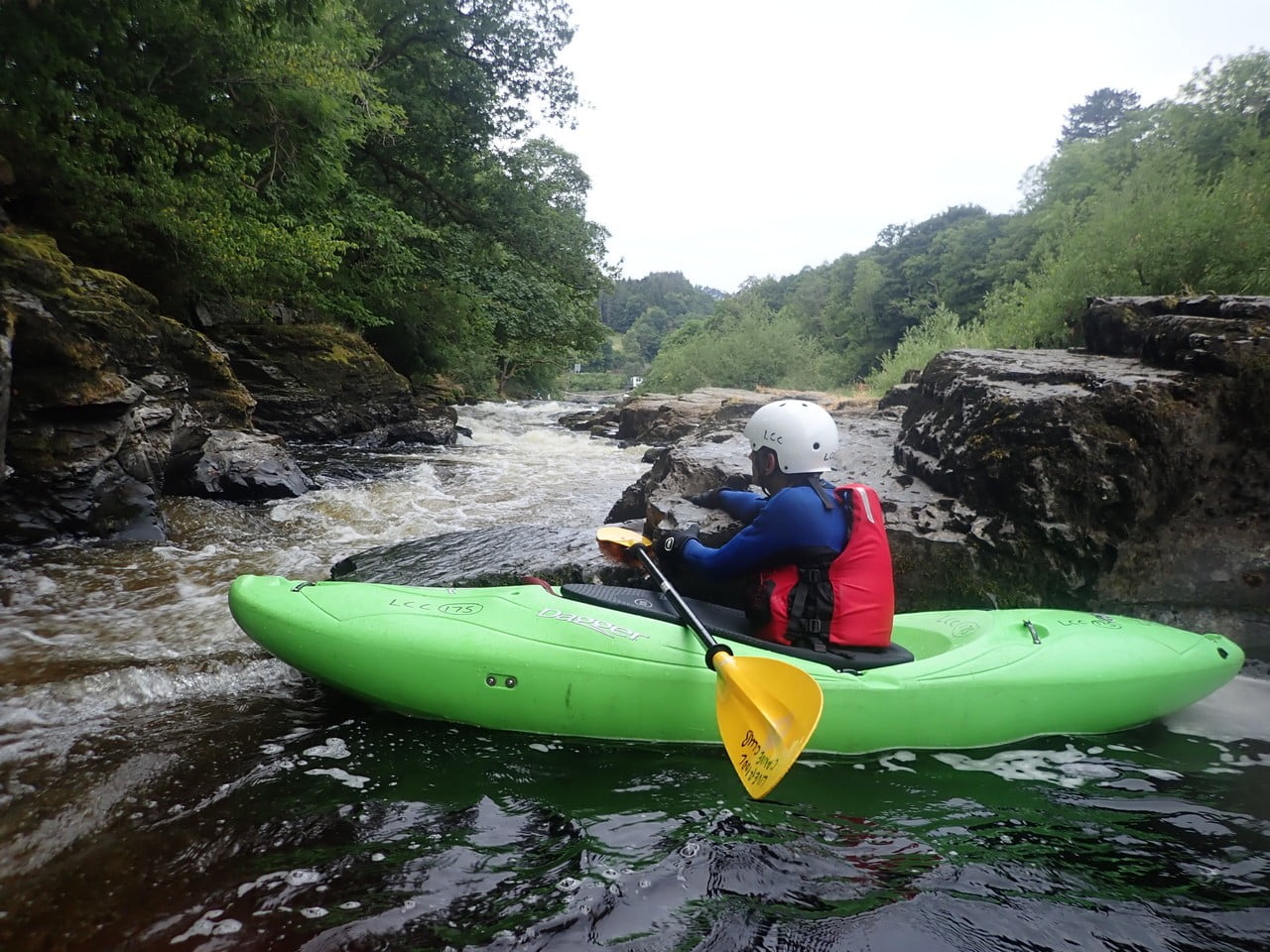
The overall standard of the run is grade 2, but there may be a few (normally one or two) grade 3 rapids that can be portaged if required.
Eg River Dee – Llangollen Town to Ty Mawr Country Park
Advanced Water Grade 3 & 4 (Advanced paddlers)

Grade 3 Most rapids will have irregular waves and hazards that need avoiding. More difficult manoeuvring will be required but routes are normally obvious. Scouting from shore is occasionally necessary to maintain line of sight. Eg Grade 3:Afon Seiont
Grade 4 encompasses a wide range of rivers, from those with pool-drop rapids to those with extended continuous rapids; so there is a huge variation in difficulty. It is common to distinguish easier grade 4 rapids by grading them as 4- and harder rapids as 4+ (or in some cases, 3/4 or 4/5). Eg Grade 4:Afon Ogwen or Upper River Dart in Devon
Very Advanced Water Grade V: Expert paddlers
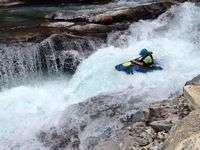
Extremely difficult rapids with precise and technically demanding routes to be followed. Stoppers, currents and waves will be powerful and inspection is essential. Paddlers know their limits.
Eg: The River Moriston in Scotland on a high release
Grade VI Extreme and Exploratory paddling
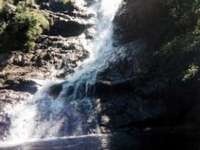
All of the above carried to extremes. Grade 6 usually means unrunnable rapids, which may just be possible in certain conditions.
Eg This warm-up rapid on the Abhainn Righ in Scotland probably conforms to most people’s idea of ‘unrunnable’. The paddler wound up in hospital…
Sea Grading System
Sheltered Water (Novice Paddlers)
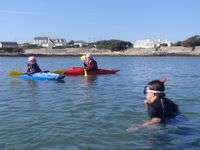
Open to novice or less expericed paddlers with suitable equipment. Closed or protected water. Usually a basic skills instruction session or social gathering. No more than 200m from shore.
Maximum Force 2, 5 knots wind or 0 m sea Eg Inland Sea
Easy Moderate Water Grade A (Improver paddlers)
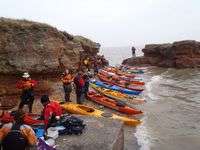
For improvers with some paddling experience. Up to 15 km per day on estuaries and lakes or other protected waters.
Maximum Force 3, 10 knots wind or 0.5 m sea Eg Hilbre Island or Conway Estuary in good conditions.
Moderate Water Grade B (Intermediate paddlers)
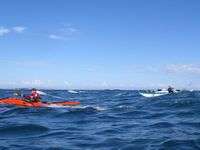
For improvers with some skills including assisted rescue, bracing, towing, and entry & exit through small surf. Up to 20 km per day, primarily on estuaries or sheltered coastlines, occasionally along less accessible coastlines for training purposes.
Maximum Force 4, 15 knot winds or 1 metre seas
Eg Rhoscolyn to Porth Dafarch, Sheltered North Coast of Anglesey in good conditions.
Advanced Water Grade C (Advanced paddlers)

For proficient paddlers, 3 or 4 Star Standard. Capable of sustained speeds of 4-6 km/h. 25 -30 km per day – Landings may be impossible. A good roll should be in evidence.
Maximum Force 5 20 knots wind or 2 metre sea
Eg Carmel Head or The Great Orm in good conditions.
Very Advanced WaterGrade C+ Expert paddlers

For advanced paddlers. 5 Star standard. Ability to self rescue in all situations. Very reliable rolling, surfing and rescue skills in severe conditions. Up to 40 km per day at speeds above 6 km/h with long open crossing or unlandable stretches. Paddlers know their limits.
Eg The Stacks or Skerries on springs or open crossing (Isle of Man)
Extreme and Exploratory paddling

For expeditionary paddlers. Extreme voyages in potentially severe conditions. Invitation only.
Paddlers will know their limits
Members are reminded that when they joined the club they would have read and accepted the warning that “canoeing is an assumed risk activity.” In particular, attention is drawn to paragraph 14.2 from our constitution.
14.2. In participating in activities related to outdoor pursuits, members and prospective Members are responsible for their own safety and well-being. The club as a body, the officers of the Club and the members and prospective Members will not be held responsible in law should accident, injury or death befall Members or prospective Members voluntarily enjoining in such activities. Before becoming a Prospective Member a waiver of any claim against the club must be signed by applicants who must also agree to abide by the club constitution and guide lines. Individuals are advised to seek advice related to insuring themselves against mishap.
If in doubt about the suitability of the trip, please ask the coordinator / organiser or a club member you trust. If you don’t see what you want – organise it!
If you are not sure where to go for a venue, look on the venues page of the website or look at past trips in the newsletters. Alternatively ask other club members for advice.
If you don’t feel like a full trip, small venues like Llangollen / Chester or sheltered beaches or Estuaries – Llandudno / Conway make great practice venues! Also, don’t just paddle, work it! Catch the eddies, surf the waves and play in the hole. Remember, a lot of knowledge we learn from our peers and by simply doing!
